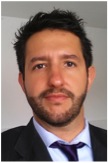Studying at the University of Verona
Academic calendar
The academic calendar shows the deadlines and scheduled events that are relevant to students, teaching and technical-administrative staff of the University. Public holidays and University closures are also indicated. The academic year normally begins on 1 October each year and ends on 30 September of the following year.
Course calendar
The Academic Calendar sets out the degree programme lecture and exam timetables, as well as the relevant university closure dates..
| Period | From | To |
|---|---|---|
| MED ING annuale | Oct 2, 2024 | Sep 30, 2025 |
| MED ING 1° semestre | Oct 2, 2024 | Dec 20, 2024 |
| MED ING 2° semestre | Jan 2, 2025 | Sep 30, 2025 |
| Period | From | To |
|---|---|---|
| Tutti i Santi | Nov 1, 2024 | Nov 1, 2024 |
Exam calendar
To view all the exam sessions available, please use the Exam dashboard on ESSE3. If you forgot your login details or have problems logging in, please contact the relevant IT HelpDesk, or check the login details recovery web page.
Academic staff
Study Plan
The Study Plan includes all modules, teaching and learning activities that each student will need to undertake during their time at the University.
Please select your Study Plan based on your enrollment year.
1° Year
| Modules | Credits | TAF | SSD |
|---|
2° Year It will be activated in the A.Y. 2025/2026
| Modules | Credits | TAF | SSD |
|---|
3° Year It will be activated in the A.Y. 2026/2027
| Modules | Credits | TAF | SSD |
|---|
4° Year It will be activated in the A.Y. 2027/2028
| Modules | Credits | TAF | SSD |
|---|
5° Year It will be activated in the A.Y. 2028/2029
| Modules | Credits | TAF | SSD |
|---|
6° Year It will be activated in the A.Y. 2029/2030
| Modules | Credits | TAF | SSD |
|---|
| Modules | Credits | TAF | SSD |
|---|
| Modules | Credits | TAF | SSD |
|---|
| Modules | Credits | TAF | SSD |
|---|
| Modules | Credits | TAF | SSD |
|---|
| Modules | Credits | TAF | SSD |
|---|
| Modules | Credits | TAF | SSD |
|---|
Legend | Type of training activity (TTA)
TAF (Type of Educational Activity) All courses and activities are classified into different types of educational activities, indicated by a letter.
Introduction to medical Humanities (It will be activated in the A.Y. 2025/2026)
Teaching code
4S012563
Credits
8
Scientific Disciplinary Sector (SSD)
-
Learning objectives
Hygiene Module
The physician's training must include knowledge of public health related to epidemiology and prevention of diseases with the highest social impact, particularly regarding those preventable with vaccinations (VPD) and the non communicable diseases (cardiovascular and tumoral) , the prevention strategies and the global health and health promotion. At the end of the course, the student must know the meaning of the health indicators; the general Italian and international health situation. The student must know the fundamental concepts of prophylaxis of infectious diseases (with particular regard to epidemics) and the prevention of non communicable diseases, the most important determinants of health and disease (risk factors), have general notions of health-environment relationship and hospital hygiene. The student must have clear the role that public health plays at the different institutional levels for the improvement of the health status of populations.
Human Sciences
The course aims to introduce students to the study of the phenomena of health, illness and medicine from the perspective of general sociology and the sociology of health. The course aims to acquaint students with the social and relational dimensions of health and illness, social inequalities in health and the experience of illness; to provide an understanding of the relationship between health/illness and society; and to acquire critical skills in reading illness situations in terms of both micro- and macro-social relations.
BIOETHICS MODULE The module aims to introduce students to the main issues of concern within the discipline of bioethics.
First and foremost, it will impart knowledge on the characteristics of bioethics: its origins, specific language, investigative methods, fields of study, principles of medical ethics and fundamental paradigms.
Subsequently, the objective of the module will be to contribute to the understanding of the dialectical dynamics of the current bioethical debate, with particular attention to the care relationship in the biomedical context of the beginning and end of life.
CLINICAL PSYCHOLOGY MODULE
Goals:
1. To provide a theoretical framework to support an integrated approach to medical consultation to understand the role of emotional and social components to the experience of illness and to the maintenance of health.
2. To develop an awareness of the role that appropriate communication plays in the clinical setting, highlighting the communication skills helpful in conducting an accurate and effective consultation, collecting all relevant clinical information; managing the relationship with the patient; educating and encouraging patient collaboration during the clinical process; acquire an awareness of the personal aspects in the clinical relationship.
To this end, process aspects will be explored in depth (interview skills and management of the relationship with the patient, also taking into account the use of electronic devices) and content aspects (factors connected to the request for treatment and construction of a therapeutic alliance; the bio-psycho-social model and the integrated approach to the patient, emotions and non-verbal communication; motivational systems, the process of adaptation to the disease; management of the patient with somatization disorders; personal awareness and burn-out).
Examination Methods
Hygiene Module Small group essay and oral examination on the course programme Human Sciences The final examination will be a written examination. The examination will consist of open questions, the number of which will vary between 5 and 6 depending on the range of answers expected. The questions will be related to the topics of the lectures and the texts indicated in the syllabus and will be designed to test knowledge of the course content. BIOETHICS Module Written Multiple-Choice Examination Clinical Psychology Module The exam will be written and based on closed multiple-choice and open-ended questions, the number of which will vary depending on the extent of the expected response. The questions will regard the topics of the lessons, the articles, and the textbook indicated in the program.
Evaluation criteria
The following parameters will contribute to the evaluation: • Knowledge and understanding in the disciplines covered by the course • Public health approach and terminology for the evaluation of health phenomena • Correctness, lucidity, synthesis and fluency The final evaluation is expressed in thirtieths Human Sciences The final test assesses the level of knowledge of the course content. The assessment criteria for the test are as follows: coherence of the answer with respect to the question and clarity of exposition; understanding of the main concepts addressed in the course; ability to organise knowledge discursively; ability to critically analyse the proposed topics; ability to establish links between the study topics. BIOETHICS Module Adherence to the following points. 1) Basic knowledge of the specific language and method of the bioethics discipline. 2) Knowledge of the main paradigms of bioethics applied to the care relationship. 3) Understanding of content, and dialectical dynamics of the bioethical debate on the topics covered in the lectures. Clinical Psychology Module The final test aims to assess the knowledge level of the scheduled contents. The following competencies will be assessed: 1. Knowledge of the topics covered; 2. Consistency of the answer concerning the question asked; 3. Clarity and linguistic appropriateness; 4. Understanding of the concepts acquired.
Free choice courses
Modules not yet included
Career prospects
Module/Programme news
News for students
There you will find information, resources and services useful during your time at the University (Student’s exam record, your study plan on ESSE3, Distance Learning courses, university email account, office forms, administrative procedures, etc.). You can log into MyUnivr with your GIA login details: only in this way will you be able to receive notification of all the notices from your teachers and your secretariat via email and soon also via the Univr app.

 giuseppe.bertini@univr.it
giuseppe.bertini@univr.it
 045-802-7682
045-802-7682








